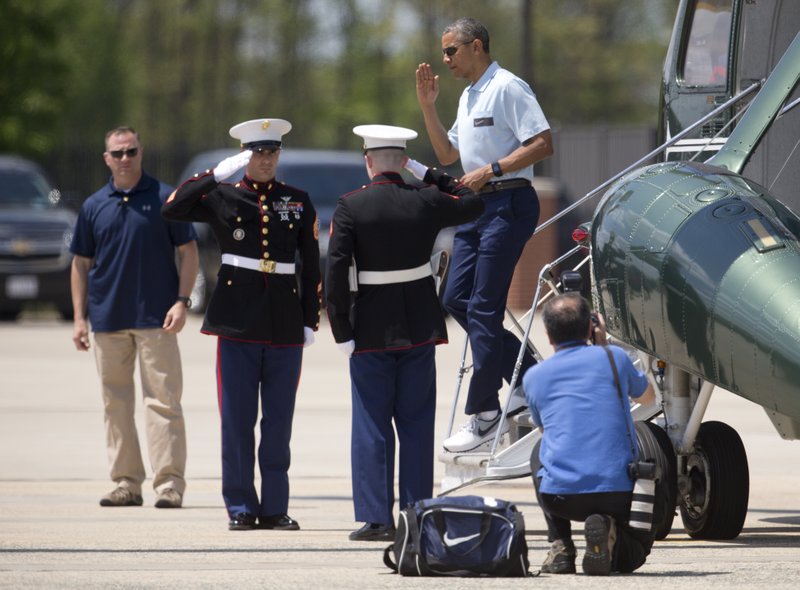WASHINGTON -- Leaders of Persian Gulf nations unnerved by Washington's nuclear talks with Iran and Tehran's meddling across the Mideast look to President Barack Obama to promise more than words and weapons at Thursday's Camp David summit.
They want commitments from Obama that the United States has their backs at a time when the region is under siege from Islamic extremists, Syria continues to unravel, Iraq is volatile and Yemen is in chaos.
"I think we are looking for some form of security guarantee, given the behavior of Iran in the region, given the rise of the extremist threat. We definitely want a stronger relationship," said Yousef al-Otaiba, the United Arab Emirates' ambassador to the United States.
"In the past, we have survived with a gentleman's agreement with the United States about security. I think today, we need something in writing. We need something institutionalized," he said.
The expectations for Obama's meetings with Gulf Cooperation Council countries -- Saudi Arabia, Kuwait, United Arab Emirates, Qatar, Bahrain and Oman -- include weapons sales, a renewed call for a coordinated missile defense system, more joint military exercises and better cooperation on cybersecurity.
A high-level Saudi official said in Riyadh that his country wants a defense system and military cooperation similar to what the U.S. affords Israel. The official, who spoke on condition of anonymity because he wasn't authorized to disclose details of the Saudis' wish list at the summit, said they also want access to high-tech military equipment, missiles, planes and satellites, as well as more technology and training cooperation with the U.S.
On Sunday, Saudi Arabia's foreign minister said King Salman will not attend the summit.
In a statement, Adel al-Jubeir said the meeting coincides with a humanitarian cease-fire in the conflict in Yemen, where a Saudi-led coalition is fighting Shiite rebels known as Houthis. He said Crown Prince Mohammed bin Nayef, who is also interior minister, would lead the Saudi delegation and the king's son, Deputy Crown Prince Mohammed bin Salman, who is defense minister, will also attend.
Obama had planned to meet King Salman one on one a day before the gathering of leaders at the presidential retreat, but the White House did not take his decision to skip the summit as a sign of any substantial disagreement with the U.S.
The U.S. and five other nations are working to finalize a deal intended to stop Iran's pursuit of nuclear weapons in exchange for easing penalties that are choking the Iranian economy. The White House says the Gulf countries would be better off with an agreement that blocks Iran's path to an atomic weapon.
But the nuclear deal is not the only source of unease.
Arab allies feel threatened by Iran's rising influence and they fear a nuclear pact will embolden Tehran. They worry that the deal would unlock billions of dollars that Iran might decide to use to further intrude in countries or support terrorist proxies.
Sen. John McCain, chairman of the Senate Armed Services Committee, said Obama will have to work hard to convince the Arab allies that they do not need to fear fallout from any nuclear deal.
"Right now they feel that they have no support from this administration so he has a steep hill to climb," said McCain, pointing to Saudi Arabia's decision to act unilaterally in Yemen.
McCain, R-Ariz., said that's why the Saudis gave Gen. Lloyd Austin, head of the U.S. Central Command, only "an hour's notice they were going to strike Yemen."
Secretary of State John Kerry is optimistic, but declined to say exactly what kind of reassurances Obama is prepared to offer at Camp David.
"I can just tell you in general terms that they have to do with the intensifying and strengthening of the security-military relationship between the United States of America and the Gulf Cooperation Council countries, as well as dealing with new challenges that we face in the region, foremost of which is the Iranian interference in the affairs of the countries of the region," Kerry said Friday in Paris.
Sen. Lindsey Graham, chairman of the Senate panel overseeing foreign aid, warned against the U.S. offering a large arms package in exchange for Gulf nations' support of a nuclear deal. Graham, R-S.C., said he isn't opposed to upgrading the military capabilities of Arab allies, but "if it has a hint of being connected to the Iran deal, I will do everything I can to make sure they never get one bullet or one plane."
Information for this article was contributed by Bradley Klapper, Aya Batrawy and staff members of The Associated Press.
A Section on 05/11/2015

